
A new type of plastic made from recycled waste degrades in less than a year.The substance, known as polyhydroxybutyrate, will soon be used mainly to produce and break down disposable products, making it environmentally friendly.This innovative material can be manufactured on an industrial scale through new processes developed by THE Fraunhofer Institute for Production Systems and Design Technology IPK and its partners.
It is hard to imagine without plastic in daily life. Plastics occupies an important position in packaging and consumer products, and are indispensable in industrial applications such as automobiles and medical engineering. It is almost uncommon to reuse and recycle plastics from fossil resources. The most important thing is that they degrade very slowly and will pollute the environment for a long time in the future. Large pieces of plastic garbage floating on the ocean prove their pollution ability.
International Bioeconomic Research Program
Given the widespread use of plastics around the world, a global recycling strategy is urgently needed.More and more governments are resorting to bans to curb the growing tide of plastic waste.There are no viable alternatives to fossil plastics on a large scale.That is why the Federal Ministry of Education and Research (BMBF), in close collaboration with Fraunhofer IPK, the Department of Biotechnological Technology at the Technical University of Berlin, regional industrial partners and international research partners from Malaysia, Colombia and the United States, has launched the International Bioeconomy research Programme.The researchers are developing a way to make polymers without using advanced resources such as mineral oil, palm oil and rapeseed oil, which can be very environmentally unfriendly to produce.
A new type of plastic much like polypropylene
The new process converts industrial waste (such as waste grease containing a large amount of mineral residue) into polyhydroxybutyrate (PHB). Microorganisms can metabolize these residues in special fermentation processes. They deposit PHB in cells to store energy. "Even if the plastic dissolves from the cells, it still cannot be used for industrial purposes because the hardening process takes too long." said Christoph Hein,head of Fraunhofer IPK's micro-production technology department. In the later production stage, the raw materials must be mixed with downstream chemical additives. For example, the research team adjusted the plasticization and processing parameters to adjust the recrystallization time to suit the time of industrial processing. The properties of the resulting biopolymer are similar to polypropylene. But the difference is that this plastic will completely degrade within 6 to 12 months.
In this method of plastic production, microorganisms synthesize the entire polymer during the biotechnology process."To do this, we convert biological residues, such as waste fat, into polyester for technical use."Hein said.The researchers and his team chose microbes as biocatalysts and genetically engineered them using molecular methods.With the help of chemical purification processes and widely optimized materials, they have been able to develop a new range of materials to meet the needs of industrial plastics.
No petroleum-based synthetic components are required
This new process not only completely abandons the synthetic ingredients based on petroleum, but also becomes a green plastic substitute. Naturally occurring microorganisms can decompose these newly developed plastics, so they do not have to be affected by the special conditions of degraded substances in industrial composting plants. They provide an eco-friendly alternative to the manufacture and degradation of disposable products and other disposable items.
The process also helps produce high-quality plastic parts for certain technical and cycle applications. The specifications of this product are higher. They may have to exhibit specific geometric tolerances and surface qualities, or have extremely high-precision reproducibility. Researchers have developed highly specialized replication processes to meet these requirements.
.
Copyright © 2026 Kolysen Packaging Integration Co., Ltd. | All rights reserved
We are here to help you! If you close the chatbox, you will automatically receive a response from us via email. Please be sure to leave your contact details so that we can better assist